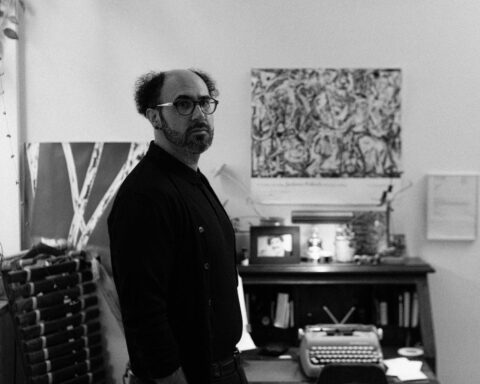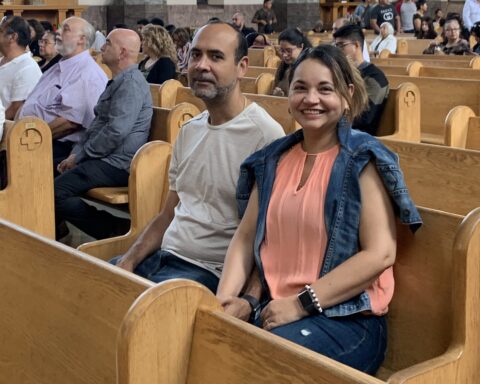 It was a book launch and discussion that should have taken place in Damascus, Baghdad, Cairo, Tripoli or any other capital of the Arab world.
It was a book launch and discussion that should have taken place in Damascus, Baghdad, Cairo, Tripoli or any other capital of the Arab world.
Instead, it unfolded in Ottawa, capital of the land of the Charter of Rights and Freedoms, as Lebanese-Canadian author Elie Mikhael Nasrallah pointed out to the audience at the launch of Hostage to History: The Cultural Collapse of the 21st Century Arab World.
Published by Friesen Press, Hostage to History is the latest book by Nasrallah, an Ottawa-based journalist, author, political commentator and immigration consultant.
Approximately 150 people – mostly Lebanese Canadians – gathered at the St. Elias Centre for the book launch.
Arab World in decline
The central thesis of Nasrallah’s book is that it is a cultural, not religious, failure that has sent the Arab world into a vortex of decline…
“We have to stop blaming colonialism, or Zionism, or the foreigner and look deep within our own culture to explain the turmoil in the Middle East,” Nasrallah told the audience, emphasizing that the pen may be mightier than the sword in places like Canada, where freedom of expression is enshrined in law and respected by the population.
The central thesis of Nasrallah’s book is that it is a cultural, not religious, failure that has sent the Arab world into a vortex of decline and chaos after a brief period of glory between the 7th and 13th centuries, when its civilization reigned supreme.
“Indeed, the Arab world of that period was in a similar situation to the U.S. today,” said Nasrallah. “It was the world’s super-power.”
According to the book, if there is one central cause for the decline and fall of a once proud civilization, it is the triumph of anti-rationalist thinking during the final years of the Abbasid Caliphate, a dynasty of the Muslim Empire. This resulted in a suspension of rational inquiry and reasoning in the Arab world.
Several factors led to the decline and fall of the Abbasid Dynasty and along with it, the collapse of rational thinking processes. These included a weakening leadership, the loss of control over distant territories, corruption and economic stagnation.
“After 1513, with the arrival of the Ottoman Turks, Arab civilization fell into a coma,” said Nasrallah, adding that after World War I and the breakup of the Ottoman Empire, the Arab heartland sank into an even deeper black hole.
Nasrallah went on to give a list of factors that he says underlie the current malaise in the Middle East. Lack of access to education and literacy skills for women; misunderstandings about the concept of freedom; lack of separation between religion and state; dependency on oil with no economic diversification; and kinship, family and clan preventing the creation of civil society institutions are among the reasons he listed.
Imam Sheikh Haitham Hujaij of the Ahlul-Bayt Centre in Ottawa said colonialism, as well as the factors cited by Nasrallah, have played a role in the upheavals of the Middle East.
Arab culture needs own enlightenment
“We don’t need to copy the European model, but we need to wash the dust off from ourselves and do a mental spring cleaning.”
Hostage to History not only provides a diagnosis of the ailments of contemporary Arab society. It also offers a prescription.
“To get out of this black hole, we need to form a cohesive group of Arabs of all faiths and start a cultural revolution, a return to Ijtihad,” Nasrallah said, citing the term in Islamic law that refers to critical thinking.
“Here, in Canada, we are living with the benefits of the Enlightenment, and we can start the process here with conversations like this,” he added, referring to the European intellectual movement that began in the late 17th century and emphasized reason and individualism.
“We need a reformation, a cultural revolution of our own, within the confines of our own culture,” he continued. “We don’t need to copy the European model, but we need to wash the dust off from ourselves and do a mental spring cleaning.”
Bridging the East and the West
“We don’t want to be just tolerated. We need acceptance as part of the Canadian family.”
Daniel Nassrallah, the Ottawa-born lawyer whose firm DNG Nassrallah Law Offices sponsored the event, said that the book launch was the first of a speaker series that he will be organizing to give a voice to the Arab community and to generate discussion.
He added that events like this could help to raise awareness of the Arab diaspora within the larger community. He explained that although Canada is a great country, negative stereotypes concerning Arabs persist and that it is important to break them.
“We need to overcome the ‘us’ versus ‘them’ mentality,” he emphasized. “We don’t want to be just tolerated. We need acceptance as part of the Canadian family.”
Ottawa City Councillor Eli El-Chantiry also referred to negative stereotyping, saying “We need to be out there and challenge these.” He praised the author and his work as a “bridge between the East and West.”
Ottawa-based writer/journalist, editor, blogger, communications professional seeking freelance opportunities in political and travel writing.





